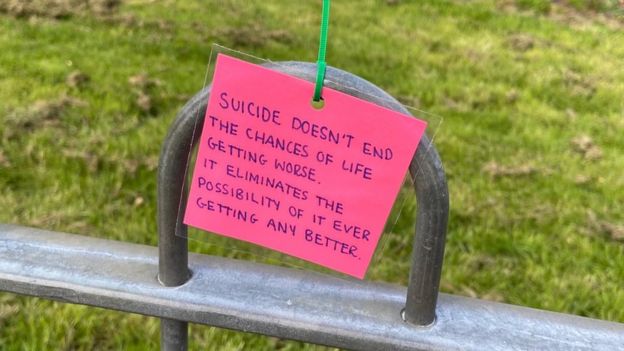
James Donaldson on Mental Health - Being prepared for a suicide crisis

One of the keys to getting through a suicide crisis is planning ahead
Matthew Miller
Executive Director, Office of Suicide Prevention
Just like any other emergency, you need to be prepared for a suicide crisis before it starts. VA offers a range of programs, initiatives and a network of support to ensure you have the resources you need.
Use an app to help you stay safe during a crisis
VA’s Safety Plan app helps you create a custom step-by-step action plan to keep yourself safe when experiencing thoughts about suicide or self-harm. The app helps you identify personal coping strategies and sources of support, giving thoughts of suicide time to decrease and become more manageable. Once you create your safety plan, you can identify your reasons to live and explore more tools to help you cope.
Get immediate access to crisis support
If you’re a Veteran in crisis or concerned about one, contact the Veterans Crisis Line to receive 24/7 confidential support. You don’t have to be enrolled in VA benefits or health care to connect.
To reach responders, Dial 988 then Press 1, chat online at VeteransCrisisLine.net/Chat, or text 838255. For more information about the Veterans Crisis Line, visit the Veterans Crisis Line webpage.
Recognize the signs of crisis
At some point, everyone will face a challenge. Some of those challenges may develop into a crisis. Recognizing a crisis in yourself or a Veteran you care about can help you know when to find support.
#James Donaldson notes:
Welcome to the “next chapter” of my life… being a voice and an advocate for #mentalhealthawarenessandsuicideprevention, especially pertaining to our younger generation of students and student-athletes.
Getting men to speak up and reach out for help and assistance is one of my passions. Us men need to not suffer in silence or drown our sorrows in alcohol, hang out at bars and strip joints, or get involved with drug use.
Having gone through a recent bout of #depression and #suicidalthoughts myself, I realize now, that I can make a huge difference in the lives of so many by sharing my story, and by sharing various resources I come across as I work in this space. #http://bit.ly/JamesMentalHealthArticle
Find out more about the work I do on my 501c3 non-profit foundation
website www.yourgiftoflife.org Order your copy of James Donaldson's latest book,
#CelebratingYourGiftofLife: From The Verge of Suicide to a Life of Purpose and Joy

www.celebratingyourgiftoflife.com
Link for 40 Habits Signup
bit.ly/40HabitsofMentalHealth
If you'd like to follow and receive my daily blog in to your inbox, just click on it with Follow It. Here's the link https://follow.it/james-donaldson-s-standing-above-the-crowd-s-blog-a-view-from-above-on-things-that-make-the-world-go-round?action=followPub
Crisis signs
These signs require immediate attention. If you’re experiencing any of these and need medical attention, call 911 now. For immediate help in dealing with a suicide crisis, contact the Veterans Crisis Line: Dial 988 then Press 1.
- Thinking about hurting or killing yourself immediately.
- Looking for ways to kill yourself right now.
- Talking about death, dying, or suicide in an immediate sense.
- Self-destructive behavior, such as drug abuse, risky use of weapons, etc.
Warning signs
These signs may indicate that someone needs help. If you or a Veteran you know is experiencing any of these, contact the Veterans Crisis Line now: Dial 988 then Press 1.
- Appearing sad or depressed most of the time.
- Hopelessness.
- Anxiety, agitation, sleeplessness or mood swings.
- Feeling as if there is no reason to live.
- Feeling excessive guilt, shame or sense of failure.
- Rage or anger.
- Engaging in risky activities without thinking.
- Increasing alcohol or drug misuse.
- Losing interest in hobbies, work or school.
- Neglecting personal welfare and appearance.
- Withdrawing from family and friends.
- Showing violent behavior, like punching a hole in the wall or getting into fights.
- Giving away prized possessions.
- Getting affairs in order, tying up loose ends or writing a will.
Take crisis support training
VA S.A.V.E. Training is designed to teach anyone who interacts with Veterans how to recognize warning signs of crisis and what to do to help a Veteran who may be at risk.
The acronym S.A.V.E. helps you remember the important steps involved in suicide prevention:
- Signs of suicidal thinking should be recognized.
- Ask the most important question of all—Are you thinking of killing yourself?
- Validate the Veteran’s experience.
- Encourage treatment and expedite getting help.
Stay safe with secure storage practices
Increasing the time and distance between a person in a suicide crisis and their access to lethal means—like guns, medications, alcohol, opioids, ropes, cords or sharp objects—can reduce suicide risk and save lives. VA’s Keep It Secure program promotes awareness about the simple steps you can take to protect yourself and your family.
Stay safe and healthy this summer by thinking ahead and becoming familiar with the resources VA offers. One of the keys to getting through a suicide crisis is being prepared.

https://standingabovethecrowd.com/james-donaldson-on-mental-health-being-prepared-for-a-suicide-crisis/


No comments:
Post a Comment